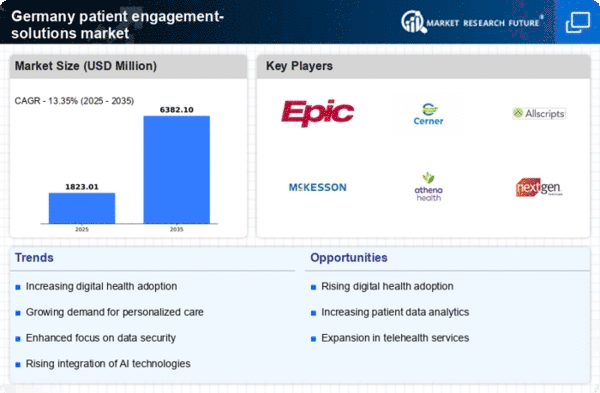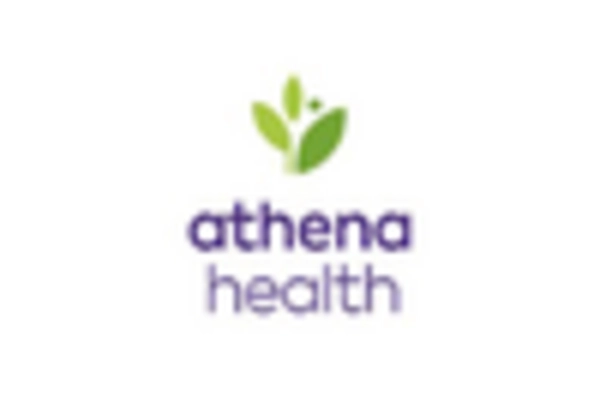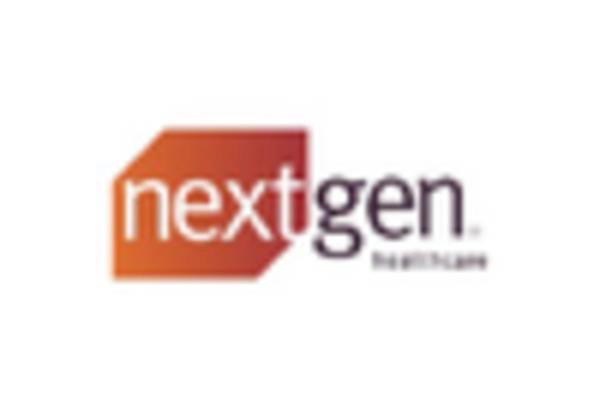Shift Towards Value-Based Care
The patient engagement-solutions market is increasingly influenced by the shift towards value-based care models in Germany. This approach emphasizes patient outcomes and cost-effectiveness, prompting healthcare providers to seek solutions that enhance patient engagement and satisfaction. As hospitals and clinics focus on improving care quality while managing costs, they are more inclined to invest in technologies that facilitate better communication and interaction with patients. Studies indicate that effective patient engagement can lead to a reduction in healthcare costs by up to 10%, making it a financially attractive option for providers. Consequently, the market is expected to expand as healthcare organizations prioritize solutions that align with value-based care principles, potentially leading to a CAGR of around 12% in the coming years.
Regulatory Support for Digital Health
The patient engagement-solutions market benefits from robust regulatory support in Germany, which fosters innovation and adoption of digital health technologies. The German government has implemented policies that encourage the integration of digital solutions into healthcare, such as the Digital Healthcare Act. This legislation facilitates reimbursement for digital health applications, making them more accessible to patients. As a result, the market is witnessing an influx of new entrants and innovative solutions aimed at enhancing patient engagement. The regulatory framework not only supports the development of these technologies but also ensures that they meet safety and efficacy standards. This supportive environment is likely to drive market growth, with projections indicating an increase in market size by approximately 20% over the next few years as more healthcare providers adopt these solutions.
Increasing Demand for Remote Monitoring
The patient engagement-solutions market is experiencing a notable surge in demand for remote monitoring tools. This trend is driven by the growing need for continuous patient observation, particularly for chronic conditions. In Germany, approximately 30% of the population suffers from chronic diseases, necessitating innovative solutions that allow healthcare providers to monitor patients outside traditional clinical settings. Remote monitoring technologies enable real-time data collection, which can enhance patient outcomes and reduce hospital readmissions. As healthcare systems increasingly adopt these solutions, the market is projected to grow significantly, with estimates suggesting a compound annual growth rate (CAGR) of around 15% over the next five years. This shift towards remote monitoring reflects a broader transformation in healthcare delivery, emphasizing proactive management and patient empowerment.
Technological Advancements in Health IT
Technological advancements in health information technology (IT) are significantly shaping the patient engagement-solutions market. Innovations such as artificial intelligence (AI), machine learning, and data analytics are enhancing the capabilities of patient engagement tools. In Germany, the integration of these technologies allows for more personalized and efficient patient interactions, improving overall healthcare delivery. For instance, AI-driven chatbots can provide patients with immediate responses to their inquiries, while data analytics can help identify trends in patient behavior. As these technologies continue to evolve, they are likely to drive market growth, with estimates suggesting an increase in market value by approximately 18% over the next five years. The ongoing digital transformation in healthcare underscores the importance of adopting advanced IT solutions to meet the needs of patients and providers alike.
Growing Emphasis on Patient-Centric Care
The patient engagement-solutions market is witnessing a growing emphasis on patient-centric care, which prioritizes the needs and preferences of patients in the healthcare process. In Germany, healthcare providers are increasingly recognizing the importance of involving patients in their own care decisions, leading to higher satisfaction and better health outcomes. This shift is reflected in the rising adoption of engagement tools that facilitate communication, education, and shared decision-making between patients and providers. Research indicates that patient-centric approaches can improve adherence to treatment plans by up to 15%, thereby enhancing overall health outcomes. As the healthcare landscape evolves, the market is expected to expand, with projections indicating a growth rate of around 14% over the next few years as more organizations adopt patient-centric engagement solutions.
















